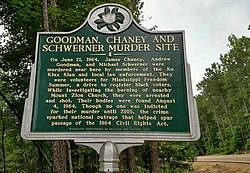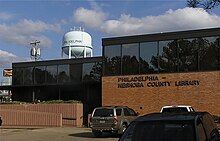Philadelphia, Mississippi
The history of the town and its influences- social, political and economic- can be seen in the many points of interest within and beyond the city limits.
These range from the large ceremonial Indian mound and cave at Nanih Waiya, built approximately 1700 years ago and sacred to the Choctaw; to the still thriving Williams Brothers Store, a true old-fashioned general store founded in 1907 and featured in National Geographic in 1937 as a source of anything from "horse collars to straw hats.
"[5] In the mid-20th century, Mississippi was a battleground of the civil rights movement as, like other states of the South, it had long disfranchised blacks and subjected them to racial segregation and Jim Crow laws.
Philadelphia in June 1964 was the scene of the murders of civil rights workers James Chaney, a 21-year-old black man from Meridian, Mississippi; Andrew Goodman, a 20-year-old Jewish anthropology student from New York City; and Michael Schwerner, a 24-year-old Jewish CORE organizer and former social worker, also from New York.
Ku Klux Klan members (including Cecil Price, a deputy sheriff of Neshoba County) released the three young men from jail, took them to an isolated spot, and killed them, then buried them in an earthen dam.
The murders and related conspiracy gave rise to the "Mississippi Burning" trial, United States v. Price.
On August 3, 1980, Ronald Reagan gave his first post-convention speech at the Neshoba County Fair after being officially chosen as the Republican nominee for President of the United States.
I believe we have distorted the balance of our government today by giving powers that were never intended to be given in the Constitution to that federal establishment."
[8][9] Dupree scored 87 touchdowns total during his playing time in high school, breaking the record set by Herschel Walker by one.
[13] He defeated Rayburn Waddell, a white, three-term incumbent, by 46 votes in the Democratic primary (there was no Republican challenger).






